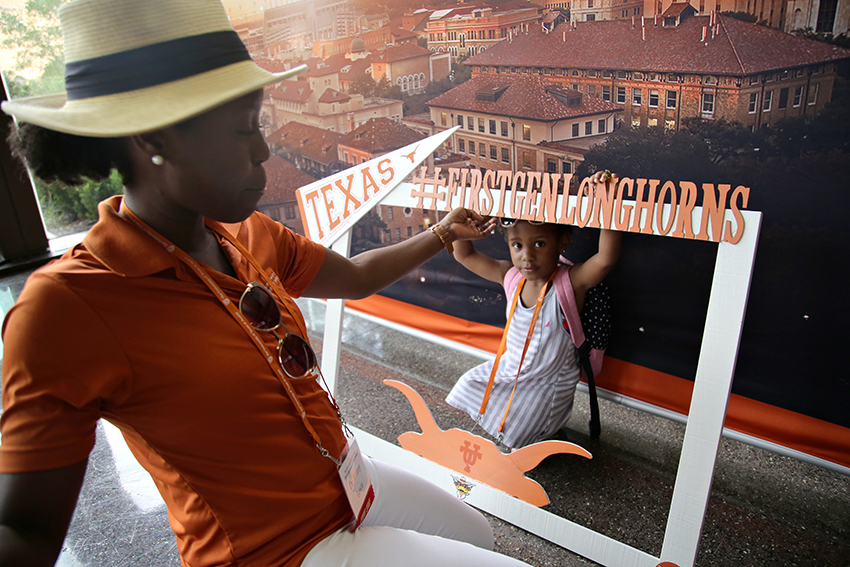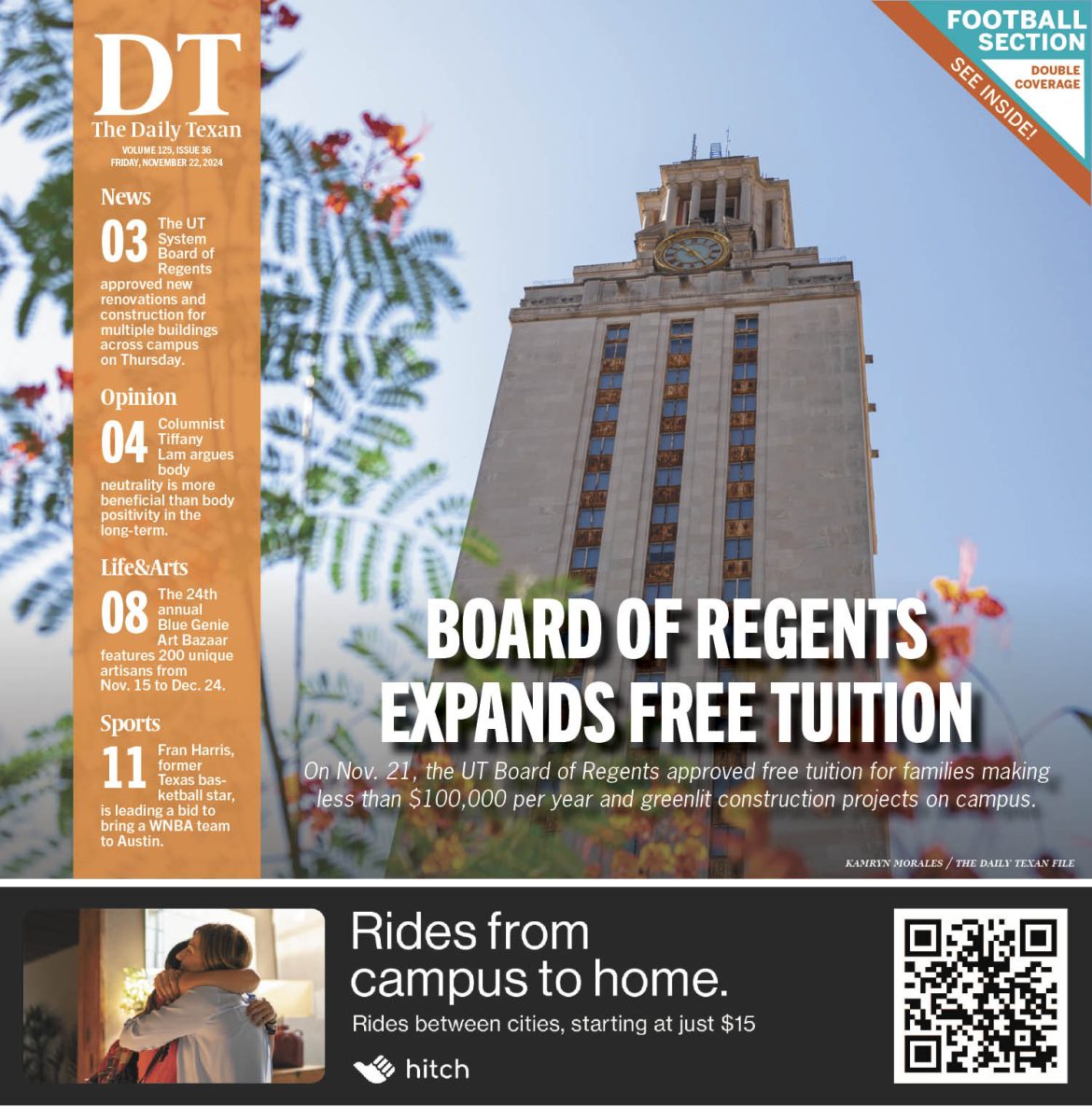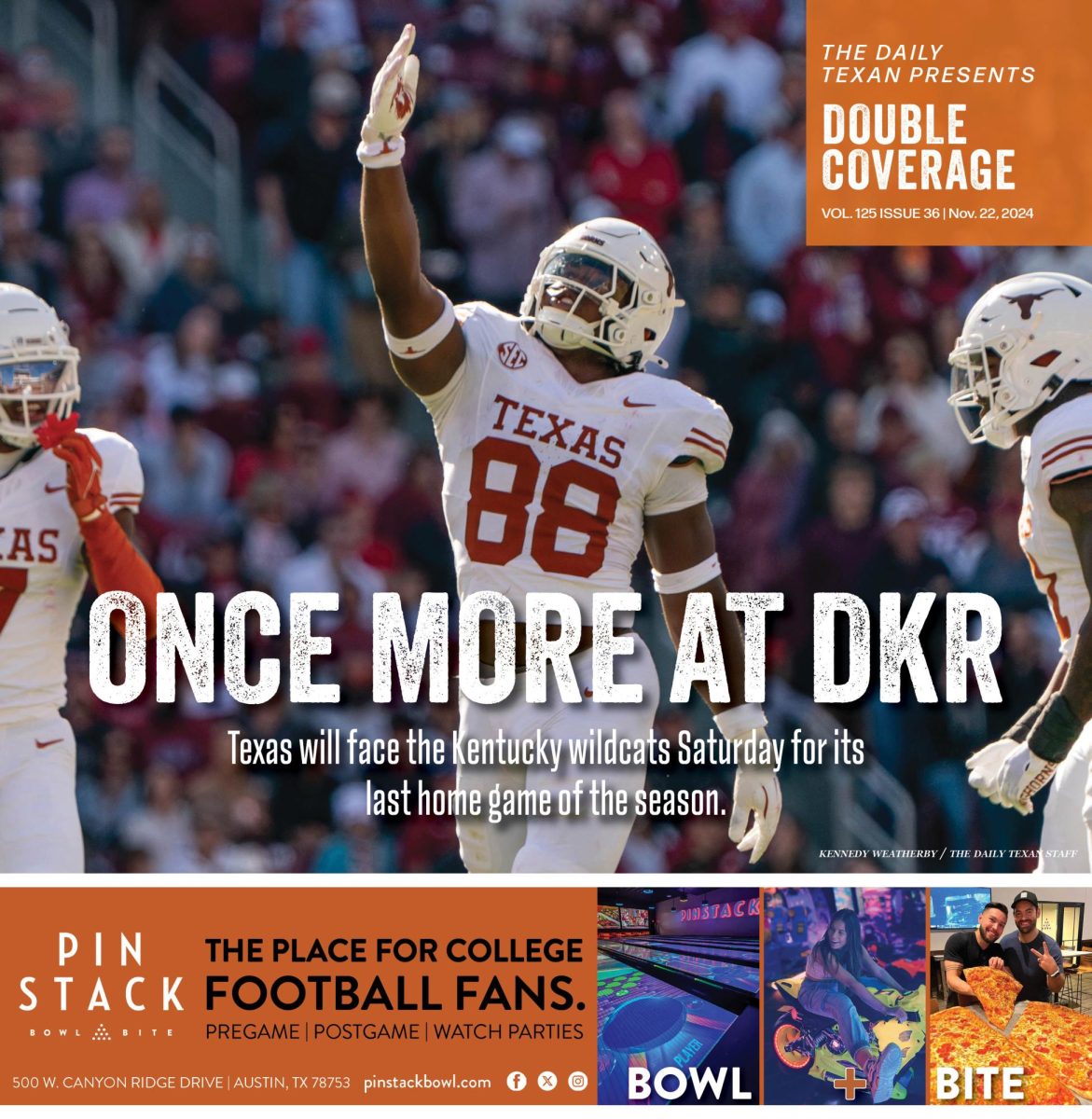‘A new era’ for first generation students
September 18, 2018
This is the first installment of the semester-long, collaborative series “First-Gen UT,” which will share the stories of first-generation Longhorns. Stories will be produced in partnership with UT’s chapters of the Asian American Journalists Association, National Association of Black Journalists, National Hispanic Journalists Association and the National Lesbian Gay Journalists Association.
Standing before a burnt orange crowd of 60 people in the Student Activity Center auditorium, Aileen Bumphus, the associate vice president of UT’s Division of Diversity and Community Engagement, asked students to stand up if they were the first in their family to finish high school.
A handful of students in the room hesitantly rose. “Please give them a round of applause,” Bumphus said. With the claps and cheers, the students eased up and Bumphus instructed them to remain standing.
“If you’re the first in your family to attend college, please stand up,” Bumphus said. This time, the majority of the students rose from their seats.
Next, Bumphus asked, “If you’re the first in your family to graduate college, stand up,” and most of the staff and faculty in the room also got up. Looking around the room, the Longhorns, all from different graduating classes, majors and hometowns, stood smiling and cheering each other on.
“We are beginning a new era at the University of Texas to celebrate first-generation students,” Bumphus said, kicking off the DDCE’s First Gen Student Workshop on Sept. 9.
Who are first-generation students?
As the daughter of Mexican immigrants, Alejandrina Guzman, a 2018 graduate and former student body president at UT, grew up well aware she would be the first in her family to earn a college degree.
“In Mexico, my parents didn’t graduate high school and much less (had) an education here,” Guzman said.
After she enrolled at UT, Guzman faced challenges at home as well as many physical obstacles maneuvering her wheelchair through campus. But she often struggled to ask for help.
The definition of a first-generation student has long been up for debate, but a movement to invest in the success of students like Guzman has spread throughout the U.S., Texas and, most recently, at UT Austin.
Cassandre Alvarado, who is the co-chair of a new working group tasked with identifying support for first-generation students at UT, said the University currently defines first-generation students as those with parents “who have not earned a higher education degree from a U.S. institution” but welcomes anyone to self-identify as a first-generation student.
For the 2017 academic year, 22.4 percent of 8,238 incoming freshmen at UT identified themselves as first-generation students in application and enrollment materials, according to University data.
Although the majority (45.5 percent) of these first-generation students also identified as Hispanic and 38 percent came from families earning $40,000 or less, Alvarado said first-generation students can come from all racial, ethnic and socioeconomic backgrounds.
Regardless of background, being a first-generation student can make a big difference. For UT’s 2013 cohort of students, the 4-year graduation rate of first-generation students lagged behind that of non-first-generation students by about 9 percentage points.
A new focus in Texas
As Texas demographics continue to shift with a growing population of young Latinos, the success of first-generation students will become more of a priority, said Rebecca Karoff, the University of Texas System’s vice chancellor of academic affairs.
“They are here, and they’re enrolling, but I also think there’s been — in Texas and certainly the UT System — a passionate embrace of serving populations we weren’t serving before,” Karoff said.
Across UT System institutions, various campaigns and initiatives in support of first-generation students have sprouted in recent years. In 2016, UT-San Antonio, where about 45 percent of students are first-generation, launched “familias” or networks of first-generation faculty and staff to support students. The campus is also now decorated with posters of its first-generation community, and it offers first-generation T-shirts and graduation stoles.
This academic year, UT-Dallas launched a program that specifically houses 20 first-generation students together. First-generation students make up 12 percent of its 2018 freshman class.
Other University systems, like Texas A&M and the University of North Texas, offer scholarships specifically geared towards first-generation students and have various outreach efforts to connect with populations from which first-generation students often come from.
‘A new era’ at the University of Texas at Austin
Guzman eventually realized a lot of her friends were also first-generation students and shared similar difficulties but did not talk about it.
“When you’re first-gen, you got that pride, and you don’t want others to see your struggle,” Guzman said.
So she ran for student body president on the platform point to make support for first-generation students more visible.
After Guzman won and became UT’s first Latina and differently abled student body president, she created a first-generation committee in the Division of Diversity and Community Engagement. The committee quickly launched a workshop and open house with UT President Gregory Fenves last fall and a networking reception in the spring.
“I never imagined this,” Guzman said when she returned to campus for the workshop as the keynote speaker. “I hoped this would be an annual event but didn’t think it would happen.”
Under leadership from Alvarado and faculty, the Provost’s office also launched their own first-generation commitment working group last spring. The group is currently studying how the University can better support first-generation students and their families.
DDCE executive director Helen Wormington, who is helping to continue Guzman’s work, said first-generation students will be celebrated for National First Generation College Celebration on Nov. 8 with events across the 40 Acres.
Wormington, the daughter of Korean immigrants, arrived at UT 25 years ago as a high achieving student, but she soon found herself struggling academically and feeling out of place.
“I had friends, but I didn’t necessarily have people who had my same problems, working and having parents who did not attend college,” Wormington said. “I personally wish I had had this experience.”





